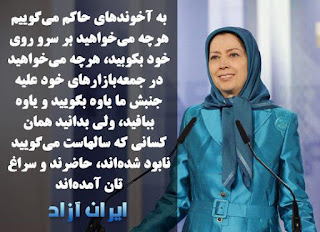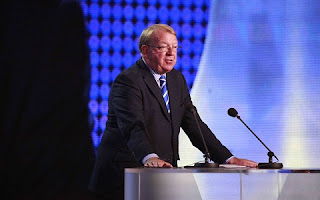What Does The Future Hold For Iran
Heshmat Alavi
JUL 6, 2017
JUL 6, 2017
With developments regarding Iran and the Middle East on fast forward recently, voices are heard speaking of winds of change in Iran. Iran’s society, described as a powder keg due to social discontent, is literally simmering.
And after far too many years, the international community is gradually but surely realizing how appeasement will only yield further destruction. Catapulting events further is Iranian Supreme Leader Ali Khamenei’s failure to engineer the recent presidential election to unify his regime for the tsunamis ahead.
Iranian opposition leader Maryam Rajavi was the keynote speaker of a recent convention in Paris where she delivered a very different and new perspective on how to resolve the Iran dilemma.
We are also only a week away from July 14th, marking the second year of the Iran nuclear deal signing. Despite a windfall of over $100 billion dollars pouring into Iran, this agreement has failed to provide meaningful change in people’s lives.
And yet, Tehran has in fact allocated these funds to fuel turmoil across the Middle East, in Syria, Iraq, Yemen and beyond.
Returning to Iran’s milestone May 19th presidential “election”, Khamenei attempted to end his regime’s impasse by placing his weight behind conservative cleric Ebrahim Raisi in that race.
Considering Raisi’s notorious role in the 1988 massacre of over 30,000 political prisoners, and a massive campaign launched by activists of the Iranian opposition People's Mojahedin Organization of Iran (PMOI/MEK) inside Iran, Khamenei’s candidate stood no chance.
However, the fact that the incumbent President Hassan Rouhani was able to secure a second term will not render any change in the regime’s status quo. In fact, quite the opposite.
In an attempt to fabricate the final vote tally, the mullahs’ regime boasted a 70+ percent voter participation. Merely a month later, however, Iran’s Assembly of Experts, an 88-cleric body tasked to select the next supreme leader and supposedly maintain him under their oversight, issued a statement declaring “people’s votes, demands and views” are of no significance whatsoever. This is the Iranian regime’s definition of democracy.
Thus, with a look at the past 38 years and the ever so changing status in and out of Iran today, there are three initial conclusions we can reach:
1) The rule of the mullahs’ dictatorship in Iran must come to an end.
2) Such an objective is now within reach more than ever before. Rifts inside Iran’s political hierarchy are inflicting deep, irrecoverable wounds.
3) In contrast to its neighbors, Iran enjoys a democratic alternative and an organized opposition movement fully capable of setting this regime aside.
For those continuing to advocate a policy of encouraging reform from within, this regime will not be reformed. Period. This has been proven through 20 years of three presidents claiming to be reformists/moderates. The slate includes Akbar Hashemi Rafsanjani, Mohammad Khatami and the current Hassan Rouhani.
All the while, for three decades the West has gone the limits in testing the appeasement policy. Unfortunately, lessons have not been learned from Chamberlain’s disastrous agreement with Hitler.
And yet, despite the deafening propaganda orchestrated by the mullahs’ regime, this apparatus is threatened most not by a foreign foe, but the numerous protests and revolts witnessed each day through Iran. This is a ticking time bomb winding down fast.
The regime’s incompetence in resolving domestic and foreign dilemmas, and its failure to obtain nuclear weapons has left the ruling regime highly concerned over the road ahead.
Unfortunately, the countries going through the Arab Spring had no alternative apparatus to replace their ousted ruling governments. This is not the case with Iran.
The National Council of Resistance of Iran, (NCRI), an umbrella coalition with the PMOI/MEK as its core member, enjoys vast influence inside Iran, seen in the following developments:
1) Back in 2009 the NCRI established the main uprising core across Iran, elevating the motto of “Where is my vote?” to a more demanding, “Down with the Dictator.”
2) For a year now the NCRI has directed a campaign focusing on seeking justice regarding the 1988 massacre. Iran, with its very young population, witnessed the regime succumbing to the people’s will of condemning Raisi for his role in the mullahs’ decades of executions.
From day one of their rule the mullahs have been at war with the entire Iranian population. All other wars, especially the devastating Iran-Iraq War of the 1980s, the ongoing onslaught in Syria and Iran’s role in the killings, and the regime’s faceoff with the international community over its effort to build an atomic bomb, have been aimed at cloaking this ultimate war.
Thus, it is a mistaken conclusion to believe Iran resorting to such wars are signs of its strength. With no government stepping up to the plate to confront Tehran’s all-out belligerence.
It has only been the Iranian opposition, represented by the NCRI, leading the effort to expose the mullahs’ true nature. The NCRI hoisted the flag peace and freedom in response to the mullahs’ warmongering, been the sole supporter of the Syrian people from their first protests back in March 2011, and continuously blown the whistle on Iran’s notorious nuclear and ballistic missile ambitions.
Four decades of appeasement in the face of Iran’s human rights violations, deadly meddling in the Middle East and beyond, terrorism and a concentrated nuclear/ballistic missile drive, have failed miserably. There is also no need for another devastating war in an already flashpoint region.
A solution is at hand, demanding strong and brave decisions by the United Nations, European Union, United States and regional countries.
a) Designating the Revolutionary Guards as a foreign terrorist organization;
b) Revoking Tehran’s membership from all international organizations, including mainly the UN and the Organization of Islamic Cooperation;
c) Setting international tribunals to hold Khamenei and other senior Iranian regime officials accountable for gross human rights violations and crimes against humanity;
d) Recognizing the Iranian people’s legitimate resistance to topple the mullahs’ rule.
This regime has taken advantage of a highly flawed appeasement policy for too long. The Iranian people and their organized resistance, pioneered by the NCRI, need not a single dime, rifle or bullet. Together they are more than able and absolutely capable to end the mullah's rule.
“…the ultimate solution to the crisis in the region and confronting groups like ISIS, is the overthrow of the Iranian regime by the Iranian people and Resistance,” Mrs. Rajavi said.






Comments
Post a Comment